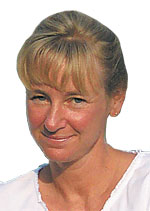Positive Parenting: The Importance of Drawing Boundaries
 “Did you wear my sweater without asking?”
“Did you wear my sweater without asking?”
“Bobby, this is the third time I’ve had to bring your lunch to school this week.”
“I fed your gerbil again.”
“Jennifer, have you taken my eyebrow tweezers again?!!??”
These are the laments of family members whose boundaries have been violated. We know when ours have been crossed, but understanding boundaries isn’t so easy.
According to Dr. Henry Cloud and Dr. John Townsend, “a boundary is a ‘property line’ that defines a person; it defines where one person ends and someone else begins… A child [is no different and] needs to know where she begins, what she needs to take responsibility for, and what she doesn’t need to take responsibility for.”
When parents forget their boundaries, they are inclined to try to make everything better, to rescue and to take over.
The result? Children can feel that they are unheard, incapable and incompetent. Adults feel impatient and resentful.
In the example of the forgotten lunch above, the responsibility to remember belongs to Bobby.
Dad remembering for him takes the responsibility away from Bobby and deprives him of an opportunity to learn about accountability and consequences.
Discovering that he can correct his mistake with Dad’s support allows Bobby to build the confidence he will need to handle bigger mistakes later on.
Lectures and nagging are a poor substitute for experiential learning.
Yes, it’s uncomfortable for parents. If your intention is to honor boundaries and teach responsibility, you must find a way to handle that discomfort yourself.
Why? Because that lies within your boundaries.
Parents need to handle their feelings and problems, and to fulfill their responsibilities as their child’s teacher.
A parent’s job is to validate, listen to and support their child.
Doing so encourages the child to grow in self-knowledge, courage and confidence.
If there is a boundary issue at your house, ask yourself, “To whom does this belong?”
Take the time to figure out the answer. Getting clear on your boundaries will allow you the freedom to teach and support your child as he learns to handle what belongs to him.
__________________________________
Lesley Iwinski is a Lexington mother of three children ages 16-22, a family physician and the founding director of Growing Peaceful Families. She offers classes, workshops and seminars based on the work of Kathryn Kvols, author of Redirecting Children’s Behavior.
Info for Lesley: (859) 333-3053 or www.GrowingPeacefulFamilies.com. E-mail questions for Lesley to john@www.lexingtonfamily.com or encourage1another@insightbb.com.

